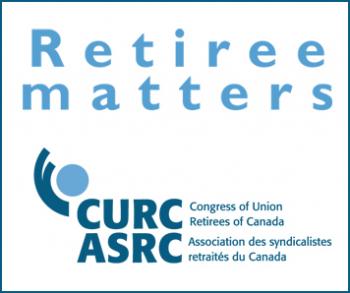Chip in to keep stories like these coming.
The second day of the Union Coalition for Free Negotiation’s States-General took place in Montreal on April 27, 2015. We heard from distinguished guest speakers who introduced us to the reality of women’s pensions vs. those of men. Several statistics emerged, showing realities that the majority of women may not know.
Demographics
Quebec statistics in 2014 show that as the aging population increases, the percentage of women relative to men also increases; at age 80 and over, the percentage of women versus men is 63.5 per cent.
We also know that women’s life expectancy is longer. They can expect to live to 86 years, about three years longer than men.
Retirement income
In 2011, 52 per cent of women and 42 per cent of men were poor enough to receive the national guaranteed income supplement. Public plans represent 32 per cent of men’s income and 50 per cent of women’s income, according to calculations by Quebec’s Minister of Finance and Economy in 2014. The total income of men relative to women is a ratio of 59 per cent or $44,130 for men and $25,867 for women. This is understandable, because men can make higher investments with better pay than women.
Gaps that women face
Women are more likely to interrupt a job to take care of their families, which contributes to gaps in their working years. Compared to men, women reduce their work hours, take longer leaves of absence, and are more prone to quitting their job.
Moreover women are more likely to have part-time jobs that often offer smaller and fewer benefits, especially with respect to pension benefits.
Working part time, spending fewer years in the labour market and earning less pay are factors which result in women retirees having much lower benefits and smaller investment savings (with less pay they don’t have the means to make as significant investments).
Finally, single women tend to build up nest eggs which are one-third smaller than the savings of women in relationships.
Special measures for women
That is why we must try to improve the situation of women in their retirement. There are special measures for women to be taken into consideration:
- 1. Improve benefits under the Canada Pension Plan (CPP) and the Guaranteed Income Supplement by 15 per cent.
- 2. Restore the age of eligibility to 65 for Old Age Security (OAS).
- 3. Increase career income earnings by 25 to 50 per cent.
- 4. Support the implementation of proactive legislation on pay equity to reduce the wage gap between men and women.
- 5. Increase the exemption on contributions of $3,500 to $7,000 to reduce the cost for low-wage workers and their employers.
The future
Of course these changes will not happen without action. Women must mobilize and raise awareness for their future retirement. Here is some advice:
- 1. Start saving as soon as possible: it’s important to start saving as soon as your first job. Time is on your side. You must contribute regularly, even if it requires an effort.
- 2. It is important to contribute to your retirement savings every year or even every month.
- 3. Plan a sum in your monthly budget based on your wage conditions, and ask a financial institution to withdraw the amount by direct debit.
Conclusion
Following the example of men, women should increase their knowledge of financial matters and take better care with financial matters. In particular, single women must catch up in retirement planning.
We need to address this issue. We have to talk. Mobilize. Educate our young and not-so-young working sisters. Push governments to change. In this election year, let us talk to our representatives and elect a government that will work for women.
It’s important to make plan from the first job or career. Do not wait to be 50 or 60 years old to do so because there could be surprises. In our meetings with the Union Coalition of Free Negotiation, we learned that many nowadays pension plans are in trouble and pensions are no longer as guaranteed as they were before.
So it is up to us women to do something. As for myself, I’ll keep fighting.
Retiree Matters is a monthly column written by members of the Congress of Union Retirees of Canada (CURC) that explores issues relevant to retirees, senior citizens, their families and their communities. CURC acts as an advocacy organization to ensure that the concerns of union retirees and senior citizens are heard throughout Canada.



